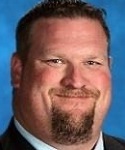
Changes Accompany Start of Fall Practice
August 8, 2019
By Geoff Kimmerly
Second Half editor
An assortment of game rules, preseason policy and postseason tournament changes will greet more than 100,000 high school student-athletes as 2019-20 Fall practices begin next week for nine sports for which the MHSAA sponsors postseason tournaments.
The most immediately noticeable adjustment will allow boys soccer, girls and boys cross country, boys tennis and girls golf teams to begin practice Monday, Aug. 12, along with football teams across the state.
Football practice traditionally begins before the rest of fall sports, by rule on the 16th Monday before Thanksgiving. However, a change approved by the MHSAA Representative Council will allow sports with MHSAA Finals tied to a specific weekend every fall – for example, Lower Peninsula Cross Country Finals always are the first weekend in November – the opportunity to begin practice on that 16th Monday as well, which will keep those teams from losing about a week of practice and competition during “late” Thanksgiving years when the holiday is during the fourth full week of November. Volleyball and Lower Peninsula girls swimming & diving – which, like football, have Finals tied to Thanksgiving – are not affected by the lateness of the holiday and will begin practice Wednesday, Aug. 14, keeping with their traditional starts.
Football teams must have 12 days of preseason practice at all levels before their first game, over a period of 16 calendar days before the first kickoff, with the first games this falls scheduled for the weekend of Aug. 29-31. Competition this fall may begin Aug. 16 for cross country, golf, soccer and tennis and Aug. 23 for volleyball and swimming & diving.
The most publicized change in MHSAA policy this fall likely will be the addition of limited seeding for Lower Peninsula Boys Soccer District play, using a Michigan Power Ratings (MPR) formula that debuted to assist in Boys Lacrosse Regional seeding this past spring and will be utilized as well for Districts in girls and boys basketball this winter and girls soccer beginning in 2020. The MPR formula ranks teams based on success and strength of schedule, with the top two teams in each District then placed on opposite sides of the bracket on the draw date for that sport. For boys soccer this fall, all games reported to the MHSAA through Sept. 28 will be used for MPR, with brackets announced Sept. 29. For more information on MPR and the boys soccer selection process, go to the MHSAA Website’s Boys Soccer page and see the information under “Tracking the Tournament."
Football remains the most played sport among MHSAA member school student-athletes and will introduce this season a series of in-game and practice-related changes. To improve pace of play, all varsity games will be played with a 40-second play clock that begins after the conclusion of the previous play except when there is an exception (penalty, timeout, etc.). In those circumstances, a 25-second clock will start with the referee’s ready-to-play whistle. Also beginning this football season, at the MHSAA Finals level, instant replay will be used to review all scoring plays and turnovers or potential scoring plays and turnovers (that is, when an official’s decision may have prevented or awarded a score or turnover). Replay review will be automatic in these situations.
The other notable rules changes in football continue a focus on safety. Tripping a ball carrier – that is, intentionally using the lower leg or foot to obstruct a runner below the knees – now will result in a 15-yard penalty. The definition of a horse-collar tackle also has been expanded to include grabbing of the name plate area on the back of the jersey (along with the inside of the neck area of the jersey or shoulder pads) to bring a runner to the ground. Horse-collar tackling also is penalized with a 15-yard personal foul.
Also beginning this season, the amount of practice “collision” contact will be defined in minutes instead of allowed days. Teams will be allowed no more than six hours of full-pads collision contact per week during the preseason and no more than 30 minutes of collision contact during a week of in-season (after games begin) practice. “Collision” is defined as contact at game speed, with the execution of full tackles at a competitive pace, taking players to the ground. Although “collision” contact will be limited, “thud” contact will be unlimited. “Thud” is not considered collision contact and defined as full speed but above the waist only, with no player taken to the ground and no winner or loser.
All fall sports face at least minor rules changes this season, and a few of the other most noticeable in-game adjustments will come in girls golf, volleyball, girls swimming & diving and boys soccer.
• In golf, athletes will be allowed to use cell phones in four situations – to call a coach or tournament administrator for a health and safety issue, for use in inputting scores for live scoring or other scoring applications, to contact a rules official with questions, and for use as a distance-measuring device.
• Also in golf, a new rule sets the maximum allowable score per hole at 12 strokes.
• In volleyball, attempted serves that make contact with a backboard or other support device hanging from the ceiling over the serving area now will be illegal serves instead of faults (which previously allowed the server another attempt). Also, when a ball in play strikes the cables or diagonal poles used to retract baskets or similar apparatus to the ceiling, the game official will stop play and determine if the ball was playable -- if it is ruled playable before making contact with the apparatus, there will be a replay; if the ball is deemed to have not been playable, it will be ruled out of bounds.
• Also in volleyball, a change regarding uniforms will make the libero more recognizable. A libero’s uniform top must clearly contrast with those of the rest of her teammates by using another predominant color. The libero’s uniform may be trimmed with the predominant color of her non-libero teammates’ uniforms, and vice versa. Also regarding volleyball uniforms, “00” may no longer be used as a jersey number, only numbers 0-99 to eliminate confusion.
• In swimming, the definition of a legal finish has changed to include a competitor touching any part of the finish end of the lane, not just the touch pad. In diving, the degree of difficulty was adjusted for back and reverse somersaults to provide consistency with difficulty of other dives.
• The game clock will stop in boys soccer beginning this fall when the team leading the game makes a substitution during the final five minutes of the second period of regulation or second part of overtime. This stoppage aims to prevent the team in the lead from using substitutions as a way to run time off the clock.
The 2019 Fall campaign culminates with postseason tournaments beginning with the Upper Peninsula Girls Tennis Finals during the first week of October and wraps up with the 11-Player Football Finals on Nov. 29 and 30. Here is a complete list of fall tournament dates:
Cross Country
U.P. Finals – Oct. 19
L.P. Regionals – Oct. 25 or 26
L.P. Finals – Nov. 2
11-Player Football
Selection Sunday – Oct. 27
Pre-Districts – Nov. 1 or 2
District Finals – Nov. 8 or 9
Regional Finals – Nov. 15 or 16
Semifinals – Nov. 23
Finals – Nov. 29-30
8-Player Football
Selection Sunday – Oct. 27
Regional Semifinals – Nov. 1 or 2
Regional Finals – Nov. 8 or 9
Semifinals – Nov. 16
Finals – Nov. 23
L.P. Girls Golf
Regionals – Oct. 7, 8, 9, 10, 11 or 12
Finals – Oct. 18-19
Soccer
Boys L.P. Districts – Oct. 9-11 & 14-19
Boys L.P. Regionals – Oct. 22-26
Boys L.P. Semifinals – Oct. 30
Boys L.P. Finals – Nov. 2
L.P. Girls Swimming & Diving
Diving Regionals – Nov.14
Swimming/Diving Finals – Nov. 22-23
Tennis
U.P. Girls Finals – Oct. 2, 3, 4 or 5
L.P. Boys Regionals – Oct. 10, 11 or 12
L.P. Finals – Oct. 18-19
Girls Volleyball
Districts – Nov. 4-9
Regionals – Nov. 12 &14
Quarterfinals – Nov. 19
Semifinals – Nov. 21-22
Finals – Nov. 23
The MHSAA is a private, not-for-profit corporation of voluntary membership by more than 1,500 public and private senior high schools and junior high/middle schools which exists to develop common rules for athletic eligibility and competition. No government funds or tax dollars support the MHSAA, which was the first such association nationally to not accept membership dues or tournament entry fees from schools. Member schools which enforce these rules are permitted to participate in MHSAA tournaments, which attract more than 1.4 million spectators each year.

Crowley, Lintner & Smelis Named 2022 Bush Award Recipients
By
Geoff Kimmerly
MHSAA.com senior editor
August 11, 2022
Lowell’s Deanne Crowley, Owosso’s Dallas Lintner and Fenton’s Mitch Smelis all have provided more than two decades of service to Michigan educational athletics, Crowley as a highly-regarded coach and administrator, Lintner also as an administrator and educational leader and Smelis as an athletic trainer and prominent voice in the sports medicine community especially in its service to school sports.
To recognize their significant and continued contributions to educational athletics, Crowley, Lintner and Smelis have been named recipients of the Michigan High School Athletic Association’s Allen W. Bush Award for 2022.
Al Bush served as executive director of the MHSAA for 10 years. The award honors individuals for past and continuing service to school athletics as a coach, administrator, official, trainer, doctor or member of the media. The award was developed to bring recognition to people who are giving and serving without a lot of attention. This is the 31st year of the award, with selections made by the MHSAA's Representative Council.
Crowley began her coaching career at Lake Odessa Lakewood in 1987 with subvarsity basketball, and she took over Lowell’s girls varsity program in 2000 after previously beginning her teaching career there in 1998. She remained the Red Arrows’ coach through 2006, that season leading her team to the Class A Semifinals – and she also was named Class A Coach of Year in 2004 by The Associated Press. Crowley became an assistant principal at Lowell in 2010 and the high school’s athletic director in 2013.
 She earned her certified athletic administrator designation from the National Interscholastic Athletic Administrators Association (NIAAA) in 2018 and was named Region 4 Athletic Director of the Year this past school year by the Michigan Interscholastic Athletic Administrators Association (MIAAA). Previously, she was named Athletic Director of the Year by the Michigan Wrestling Association for the 2018-19 school year and by the West Michigan Officials Association in 2021. Crowley also is a significant contributor to Lowell’s nationally-recognized Pink Arrow Pride program that raises funds annually for cancer awareness, education and support within the Lowell community; she organizes and coordinates the education program, which among other goals provides scholarships for Lowell graduates pursuing careers in medicine. She also was a co-founder in 2000 of the Lady Arrows Varsity Club, which provides leadership training for female student-athletes who have earned a varsity letter.
She earned her certified athletic administrator designation from the National Interscholastic Athletic Administrators Association (NIAAA) in 2018 and was named Region 4 Athletic Director of the Year this past school year by the Michigan Interscholastic Athletic Administrators Association (MIAAA). Previously, she was named Athletic Director of the Year by the Michigan Wrestling Association for the 2018-19 school year and by the West Michigan Officials Association in 2021. Crowley also is a significant contributor to Lowell’s nationally-recognized Pink Arrow Pride program that raises funds annually for cancer awareness, education and support within the Lowell community; she organizes and coordinates the education program, which among other goals provides scholarships for Lowell graduates pursuing careers in medicine. She also was a co-founder in 2000 of the Lady Arrows Varsity Club, which provides leadership training for female student-athletes who have earned a varsity letter.
Crowley graduated from Lakewood High School in 1983 and earned her bachelor’s degree in secondary education from Western Michigan University in 1997 and a master’s in educational administration from Michigan State University in 2002.
“I have known Dee for over 20 years, and she has always been incredibly dedicated to finding opportunities for all students, especially female student-athletes,” Uyl said. “Her years as a coach and administrator have shown a solid record of finding ways for kids to compete.”
Lintner is returning to Owosso High School as principal this fall after finishing the second half of 2021-22 as interim athletic director at Fenton High School. He first joined the staff at Owosso as a teacher in 2001-02, went to Linden as athletic director for two years beginning with fall of 2008, then returned to Owosso as athletic director and assistant principal from 2010 through the 2020-21 school year. He served as principal at Owosso Lincoln High School last school year until leaving for Fenton.
 Education has been a focus of Lintner’s work, and he received a doctorate in educational leadership from University of Michigan-Flint in 2017. He has a certified master athletic administrator designation and has served as a leadership training instructor for the NIAAA since 2015. He also has served as a facilitator for the Love and Logic parenting program.
Education has been a focus of Lintner’s work, and he received a doctorate in educational leadership from University of Michigan-Flint in 2017. He has a certified master athletic administrator designation and has served as a leadership training instructor for the NIAAA since 2015. He also has served as a facilitator for the Love and Logic parenting program.
Lintner has been an active participant with the MIAAA as well, serving as its constitution committee chairperson since 2009. He was a member of the executive board from 2015-20, including serving as president during the 2018-19 school year. As athletic director, he was a frequent host of MHSAA postseason events and a contributor to various committees, and he previously was an MHSAA registered official for track & field and coach in multiple sports. Prior to earning his doctorate, Lintner graduated from Vassar High School in 1995, then earned a bachelor's degree in education from Saginaw Valley State University in 2000 and a master’s in athletic administration from Central Michigan University in 2005.
“Dallas has provided years of solid leadership in Owosso,” MHSAA Executive Director Mark Uyl said. “This consistent approach has led to numerous improvements, and during his tenure as athletic director his school won its first state championship, with the softball program (in 2021).”
Smelis has served as an athletic trainer for 25 years with Fenton Area Public Schools, for the last decade through NovaCare Rehabilitation. He was named High School Athletic Trainer of the Year by the Michigan Athletic Trainers’ Society (MATS) in 2017 and serves as co-chairperson of its Secondary School Committee.
 Also a member of the National Athletic Trainers Association (NATA) and Great Lakes Athletic Trainers Association (GLATA), Smelis has become a key connection between the training community and MHSAA. He has contributed as a MATS liaison on multiple MHSAA sport committees, and serves on the Sports Medicine Advisory Committee and as an instructor for the MHSAA’s Coaches Advancement Program (CAP). He also has presented at the MIAAA’s annual and summer conferences on a variety of physical health and safety and mental health topics.
Also a member of the National Athletic Trainers Association (NATA) and Great Lakes Athletic Trainers Association (GLATA), Smelis has become a key connection between the training community and MHSAA. He has contributed as a MATS liaison on multiple MHSAA sport committees, and serves on the Sports Medicine Advisory Committee and as an instructor for the MHSAA’s Coaches Advancement Program (CAP). He also has presented at the MIAAA’s annual and summer conferences on a variety of physical health and safety and mental health topics.
Smelis graduated from Imlay City High School in 1991 and earned a bachelor’s degree in sports medicine from Central Michigan University in 1997. He is a certified American Heart Association instructor for CPR, first aid and basic life support and has served as lead instructor in CPR and first aid for Fenton’s coaches and staff.
“Mitch has been incredibly dedicated to keeping kids safe while playing all sports,” Uyl said. “He also has been responsible for further strengthening the good relationship between the MHSAA and Michigan Athletic Trainers’ Society, and he continues to provide valuable insight as part of our coaches education efforts.”

